Columns
- President appoints committee to probe claims which Defence Ministry under him slams as “false allegations”
- Probe panel lacks legal authority to summon witnesses; told only to examine veracity of claims; Channel 4 likely to be invited to submit evidence
- UNHRC chief calls for international investigation on Easter Sunday massacres; President’s office says former AG’s claim adds fuel to the fire
- SJB leader Premadasa changes position on international probe after UNHRC calls for investigation with international assistance; Lanka rejects UNHRC call
By Our Political Editor
The Committee will be headed by Syed Ishrat Imam, a retired Supreme Court Judge, and include Air Chief Marshal Jayalath Weerakkody, a one-time Commander of the Sri Lanka Air Force (SLAF), and Harsha Soza, President’s Counsel. Sarthanjali Maheswaran, a Senior Assistant Secretary to the President, will function as the secretary. They have been told to submit their report before October 31. The Committee held its first meeting last Thursday to discuss preliminaries. On Friday, they had a meeting with President’s Secretary Saman Ekanayake to discuss logistics.
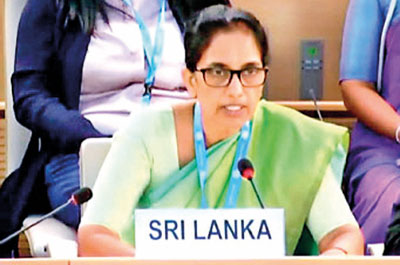
Sri Lanka’s Permanent Representative to the United Nations in Geneva, Himali Arunatilaka, speaks during the interactive dialogue at the Human Rights Council in Geneva last Monday.
The government proposes to place the Committee’s findings in Parliament thus changing an earlier move to forward them for further probe before another Parliamentary Select Committee (PSC). Nevertheless, President Wickremesinghe decided that there would be a separate Parliamentary Select Committee to investigate another aspect of the 2019 Easter Sunday massacres. That is the claim made by one-time Attorney General Dappula de Livera that there was a “grand conspiracy” behind the killings. The remarks triggered a move by the Terrorism Investigation Division (TID) of the Police to seek a statement from him. The matter ended after de Livera moved court, arguing that he made the comments in his capacity as AG and he was, therefore, not liable for any questioning.
Though he cannot challenge the PSC from being set up, it does establish a new precedent that may prevent other Attorneys General from making such public comments. It also sends a chilling message to those in the upper echelons of the bureaucracy. Significant enough, President Wickremesinghe initiated the measures after discussion with his advisors and officials before departure to Cuba and the United States.
The Catholic Church, however, is strongly opposed to the appointment of the committee. Father Cyril Gamini, the Church spokesperson, told the Sunday Times, “We are asking for an investigation by the Criminal Investigation Department (CID). That should be with some form of supervision from the international community to ensure there is transparency and impartiality among other things. For this purpose, more than 20 CID investigators who conducted probes and were transferred out should be brought back. There have been commissions and committees, but political interference has afflicted them. We are not happy with the committees. We cannot expect the truth to come out. The whole world knows this.”
Terms of references and drawback
The Sunday Times learns that the three-member Committee will be a ‘fact finding’ one and has not been given any detailed terms of reference. In other words, it will examine the veracity of the Channel 4 narrative, the factuality and discern whether it merits further investigation. A drawback, however, is the fact that it will have no legal authority to summon witnesses. It could only hope that its invitation will lead to voluntary responses. In the case of a Presidential Commission of Inquiry, there are legal compulsions for witnesses to respond. If that could restrict the number of witnesses, the rest of the Committee’s attention would have to be focused on analytical accounts of the Channel 4 narrative. It is likely that the Committee will invite Channel 4 to testify before it and produce evidence to support its claims.
The appointment of a retired Supreme Court judge was reported in these columns last week. Confirming the move in a statement, the President’s Media Division said last Sunday (September 10) that “a committee chaired by a retired Supreme Court Judge will inquire into allegations made by Channel 4.” The five-paragraph statement, surprising enough, was an antithesis to the statement put out by the Ministry of Defence a day earlier (December 9). Among the assertions made in them included:
“In a determined effort to seek truth and justice following the tragic Easter Sunday bombings of 2019, President Ranil Wickremesinghe has taken a significant step by appointing a committee, led by a retired Supreme Court judge. The committee’s primary mission is to investigate the serious allegations recently brought to light by Channel 4 broadcast video.
“The allegations have added fuel to the fire, as a former Attorney General has made similar claims, suggesting the existence of a mastermind behind the devastating Easter bomb attack. To address these concerns comprehensively, the government is poised to establish a Parliamentary Select Committee specifically to probe these disturbing assertions. The gravity of the situation has prompted the President to ensure a thorough review of all available information. As part of this process, the two forthcoming reports will be presented to Parliament, along with the existing Parliamentary Select Committee report on the Easter Sunday bomb attack and the Presidential Commission report on the same tragic event. This comprehensive approach is aimed at providing lawmakers with a comprehensive (sic) understanding of the situation, paving the way for well-informed and decisive actions………”
In marked contrast, the three-page statement headlined “Official rebuttal to Channel 4’s reprehensible allegations regarding the Easter Sunday attack” put out by the MoD asserts that Sri Lankan investigation agencies as well as their international counterparts “have consistently pointed to ISIS-affiliated group members led by Zahran Hashim as the architects of this horrifying tragedy.” Terming the Channel 4 narrative as “malicious” and “unsubstantiated,” the statement said that through “transparent investigations” the “Sri Lanka government has demonstrated an unwavering commitment” to uncovering the truth.
The statement added that the government “vehemently denounces the accusation of orchestrating the attack and assisting the bombers against a dedicated senior military officer who has served the nation for 36 years.” The statement also said: “While the Ministry of Defence respects the freedom of expression and upholds the significance of investigative journalism, the Ministry of Defence emphatically asserts that Channel 4 will be held unequivocally accountable for any unforeseen actions or repercussions stemming from their unfounded, malevolent, and poorly substantiated claims made in the video documentary……”
The stark contradictions in the statements from the Presidential Media Division (PMD) and the Ministry of Defence, are damning. More so, when Ranil Wickremesinghe, who is heading the Sri Lanka Podujana Peramuna (SLPP) government, is both the President and the Minister of Defence. A closer look at the MoD statement makes irrevocably clear that since the massacres, the curtain has come down – state and international agencies have consistently “pointed to ISIS-affiliated group members……” Yet, none with links to ISIS has been convicted so far. Nor has any evidence surfaced so far in local courts to confirm there were such connections or who the accomplices were.
That is not to say there was no evidence about ISIS links to the massacre. On January 8, 2021, the United States Justice Department put out a statement. This is what it said: “The Justice Department announced today that three Sri Lankan citizens have been charged with terrorism offenses, including conspiring to provide material support to a designated foreign terrorist organization (ISIS). The men were part of a group of ISIS supporters which called itself “ISIS in Sri Lanka.” That group is responsible for the 2019 Easter attacks in the South Asian nation of Sri Lanka, which killed 268 people, including five U.S. citizens, and injured over 500 others, according to a federal criminal complaint unsealed today.
“The complaint outlines the defendants’ roles in the conspiracy and the events that led to near-simultaneous suicide bombings in the Sri Lankan cities of Colombo, Negombo and Batticaloa on April 21, 2019. One of the U.S. citizens killed was a Department of Commerce employee who had travelled to Sri Lanka on official business.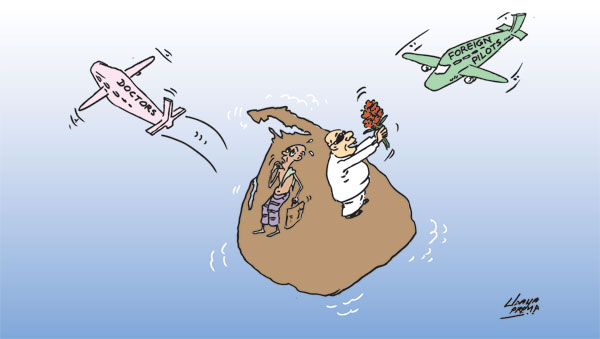
“Two days after the attacks, ISIS claimed credit for the terrorist acts, attributing the murders to “Islamic State fighters. In late April 2019, the then-leader of ISIS praised the attackers for what he called a retaliation against “the West” for defeating ISIS the prior month in Baghuz, Syria…..” Even the MoD statement refers to an investigation by the Federal Bureau of Investigation (FBI) though it falls short of referring to the convictions. A question that begs answer is whether the Federal Investigation Bureau (FBI) shared the information about the involvement of Sri Lankans with ISIS with local intelligence or investigative arms.
On the other hand, the Presidential Media Division (PMD) is emphatic that “the committee’s primary mission is to investigate the serious allegations recently brought to light by Channel 4 in a broadcast video. Therefore, they say, that “the allegations have added fuel to the fire, as a former Attorney General has made similar claims, suggesting the existence of a mastermind behind the devastating Easter bomb attack. Hence, the statement concludes that “….President Wickremesinghe’s actions represent a determined effort to uncover the truth and ensure accountability in the face of grave allegations. The path to justice for the victims and their families remains at the forefront of the government’s agenda as these critical investigations unfold.”
In essence, the MoD statement concludes that investigations were over after the massacres and those responsible have been found. However, the PMD statement contends that the whole purpose of their further action is to seek the truth. The frightening danger in such marked contradictions, particularly when it is projected to come from one person in authority, is the credibility of the government and its leaders. This is from foreign governments and other international institutions closely following developments in Sri Lanka. The puzzle for them is to discern which version to accept and which one to reject. The fact that there are seemingly inconsistent positions at the highest levels of the government does not augur well. True, there have been contradictions in the past, but one is not wrong in saying it had not reached such high levels before. Hence, any amount of chest thumping locally, singing hosannas, or castigating all others, will not be of help. Successive foreign ministers in the recent past have failed to project a correct picture or adopt cohesive measures to draw international support. They are keener in projecting themselves. This is how the Easter Sunday massacres have also become a topic for the UN Human Rights Council.
Worse enough, it is known that previous Channel 4 narratives have been lapped up by some foreign governments and the international community. That, rather, unfortunately, enhances the trust deficit between their agencies and the local intelligence community. Such a gap could widen further.
Perhaps the only consoling factor for those in the government is the pathetic situation in the main opposition. Take, for example, the call by Opposition leader Sajith Premadasa. He publicly exhorted that there should be an international investigation. Within five days, he went through a metamorphosis that prompted him to switch positions from one to another. His second proposal was for Britain’s Scotland Yard to carry out an investigation. He does not realise that it is the investigatory arm of another sovereign government. True, his father, President Ranasinghe Premadasa, persuaded the British government to send Scotland Yard to probe the assassination of Minister Lalith Athulathmudali. However, revelations in the Channel 4 programme are of a highly political nature with questions raised on previous findings. Ironic enough, Premadasa, who aspires to be the next President, has no advisers to brief him on matters related to foreign affairs and even foreign policy. He shifted position even further. This time he sought a domestic investigation supervised by foreign experts. Yet, SJB Colombo district parliamentarian S.M. Marikkar told a news conference on Thursday that his grouping sought an international investigation.
UNHRC’s call for probe
The reason for his gymnastics over an international investigation is the result of remarks made by Nada Al Nashif, Deputy Human Rights High Commissioner of the UN Human Rights Council. She made the first speech during the interactive dialogue on the High Commissioner’s report last Monday. She declared: “The (Human Rights) Commissioner has repeatedly recommended that the Government of Sri Lanka should establish follow-up independent and transparent investigation into the Easter Sunday attacks with international assistance and the full participation of victims and their representatives.” Premadasa obviously did not want to be lumped into the club of those at the UNHRC.
In marked contrast, former President Maithripala Sirisena has declared that he wants an international inquiry. The Easter Sunday massacres took place on April 21, 2019, when he was President. However, he was in Singapore on that day and drew considerable criticism for not returning to the country early. Surprising enough, Sirisena resisted calls during his tenure in office, for an international probe. The fact that he wants one now is a scathing indictment of his tenure as President and raises an all-important question. Is it not an admission that no proper investigation was conducted when he was in office? Another hurrah boy for Sirisena’s call is from parliamentarian Namal Rajapaksa. He also feels an international investigation would be necessary – a position which is bitterly opposed by his uncle and former President Gotabaya Rajapaksa. The latter strongly believes that domestic investigations have covered all aspects. Politically this is the first-time differences have surfaced publicly.
Last Wednesday, Sri Lanka’s Permanent Representative to the UN in Geneva, Himalee Arunatilaka further clarified the country’s position about the Easter Sunday massacres. She referred to the OHCHR written update and the reference to investigations. She said, “It is regrettable that the OHCHR has sought to use incorrect and unsubstantiated information from biased sources in their analysis. “As Sri Lanka has repeatedly informed this Council, extensive and comprehensive investigations have been carried out by the GoSL about these attacks including a Presidential Commission of Inquiry, the report of which was submitted to the Parliament. Investigations carried out by the Government authorities were assisted by international professional agencies including the Australian Federal Police, the FBI of the United States and INTERPOL. As at April 2023, 79 have been indicted in Easter Sunday terror attacks related matters….”
Earlier, presenting Sri Lanka’s case at the interactive dialogue on the written report of the Human Rights High Commissioner last Monday, envoy Arunatilaka repeated the protests of successive governments over the Sri Lanka Accountability Project (SLAP). She said, “At the outset, let me reiterate that the Government of Sri Lanka (GoSL) has consistently rejected Resolution 46/1 and 51/1 that led to the setting up of the so-called ‘Accountability Project’. We also reject the written update, its conclusions, and recommendations. We recall that the majority of the Member States either opposed or abstained from voting on these Resolutions, in fundamental disagreement with its unacceptable content in particular the so-called evidence-gathering mechanism, the establishment of which is unprecedented. We reiterate that it goes beyond the mandate that Member States conferred on the Council by UNGA Resolution 60/251.
“These Resolutions are intrusive and polarising. It is upheld only by a handful of countries for reasons unrelated to human rights and based on their vote bank in domestic politics. Many countries have already raised serious concerns about the budgetary implications of this Resolution given its dubious mandate. Sri Lanka has repeatedly pointed out that this is an unproductive and unhelpful drain on the resources of the Council and its Members. For all the reasons stated above, Sri Lanka will not cooperate with it. However, as an active participant of the multilateral framework and in keeping with our close engagement with the international community and the Council in other areas of its work, Sri Lanka will continue to engage constructively with other mechanisms of the Council that have been productive and beneficial to our people such as the UPR process.
“The content of the written update does not reflect the actual ground situation in Sri Lanka. The economic, social, and financial stabilisation that Sri Lanka has achieved in the past year has been appreciated and acknowledged domestically and externally. Those who are mandated and have the expertise to deal with economic and financial reforms remain confident in the country’s prospects.
It is regrettable that the OHCHR has also chosen to ignore the democratic resilience of the country and its institutions demonstrated in the past year….”
Last Monday’s interactive dialogue also saw India’s Permanent Representative to the UN in Geneva, Indra Mani Pandey, re-iterate his government’s position. He declared, “As a close neighbour and friend of Sri Lanka, India has consistently supported Sri Lanka’s efforts towards relief, rehabilitation, resettlement, and reconstruction process in Sri Lanka after 2009. India has also provided multi-pronged support, totalling more than USD 4 billion, to Sri Lanka and its people, in the last one year, to tide over its economic challenges.
“India has always been guided by two fundamental principles: (i) support to the aspirations of Tamils for equality, justice, dignity, and peace; and (ii) unity, territorial integrity and sovereignty of Sri Lanka. We hope that the Government of Sri Lanka will fulfil the aspirations of Tamils for equality, justice, and peace and its commitment to implement the Thirteenth Amendment and conduct Provincial Council Elections to ensure a life of respect and dignity for Tamils in Sri Lanka.
“We have taken note of reaffirmation by the Government of Sri Lanka on the implementation of its commitments. However, progress on the same is inadequate and we urge the Government of Sri Lanka to work meaningfully towards early implementation of its commitments to ensure that the fundamental freedoms and human rights of all its citizens are fully protected….”
No doubt, the statement is strongly worded. It comes after a visit to India by President Wickremesinghe in July this year. Nevertheless, 13A became internationalised after it found its way into a government-sponsored resolution before the UN Human Rights Council. This came after the military defeat of Tiger guerrillas in May 2009. The resolution in question defeated one that was moved by Western nations. The government celebrated the occasion with billboards in major intersections in Colombo praising its own action.
Key points in UNHRC chief’s statement
Seventeen countries spoke on Human Rights High Commissioner Volker Turk’s report on Sri Lanka. This was after Deputy Human Rights Commissioner Nada Al Nashif read out a statement on behalf of Turk. Here are a few highlights:
“One year after the remarkable protest movement demanding deep political democratic reforms, the transformation that was hoped to address long-standing challenges has still not materialized. The country continues to deal with the aftermath of the deep economic crisis of 2022 and the current stresses in global economy. Delays in holding local government elections and reconstituting provincial councils under the 13th Amendment have limited people’s right to political participation in the free expression of voters……..
“As the government implements its economic recovery policies it should be guided by its obligations under the international covenant, economic social and cultural rights to protect the most vulnerable. The international community, including international financial institutions, should keep supporting Sri Lanka in its recovery in line with the obligations around international cooperation and assistance by providing the fiscal space needed while pressing for genuine progress in governance, transparency, and accountability.
“The economic hardship, the tensions around economic and structural reform policies and the delay of local elections continue to give rise to protests. Land acquisition in the north and east for expansion of military installations, Buddhist heritage conservation at Hindu or Muslim sites, and forestry protection have also escalated tensions. Our Office continues to receive cases of misuse of tear gas and water cannons during demonstrations, affecting protestors and media personnel….
“Fourteen years since the war ended, tens of thousands of victims and their families continue to suffer in agony and grief as they await truth, justice , and remedy. The report recognizes the initiatives the Government has initiated to advance reconciliation, including its proposal for a new truth-seeking mechanism. However, it also stresses that urgent confidence-building steps are needed to create an environment in which genuine reconciliation and transitional justice processes could succeed.
“These include meaningful and transparent consultations with victims and civil society on the current truth-seeking proposal and includes an end to all forms of harassment and unlawful and arbitrary surveillance against human rights defenders and victims’ groups, as well as support for initiatives to acknowledge and memorialize the experience of victims. Truth-seeking alone will not be sufficient and must be accompanied by a clear commitment to accountability, including through an independent ad hoc special court. ……….
“While noting the Government’s rejection of resolutions 46/1 and 51/1, the report updates on the work of the accountability project established by our Office to collect, consolidate, analyze, and preserve relevant information and evidence and provide support to relevant judicial and other proceedings, including those in Member States, with competent jurisdiction. The project is receiving a steady increase in requests from competent State authorities, including in relation to 10 named individuals to date. The project has made significant progress in developing a repository of information and evidence and based on identified gaps and priorities for further investigation. It is also actively engaging with civil society, including victims’ representatives…”
The Channel 4 disclosures, just ahead of the 54th sessions of the UNHRC in Geneva, have divided a nation. A segment is strongly in favour of an international investigation whilst another contends that a probe has revealed the culprits. One can argue that it is incumbent on Channel 4 to lay bare evidence to confirm its narrative. There is no alternative if it takes up the position that its account is wholly correct and says no more. How does the government challenge it in a British court with little or no evidence with it, except to say the broadcaster is wrong? On the other hand, the main storyteller Hanzeer Azad Mowlana, who lives in Switzerland, will not forfeit his claim for asylum, by trying to adduce any proof of what he said. That is if he does have them.
Hence, the overhyped response to Channel 4 and the resultant countermeasures are an exercise in futility that will only serve less than a handful of people. Indeed, if there was a requirement to respond, one single statement after the programme was aired would have served the purpose. Too many were interested in saying too many things. The contradictions were self-serving and at great cost to the country. Who cares?
| Brief profile of probe committee members
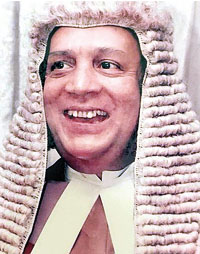 Retired Supreme Court Judge S.I. Imam Justice S.I. Imam, Chairman of the Committee to probe disclosures in the Channel 4 broadcast, served as a Supreme Court Judge from 2009 to 2013. He joined the judicial service in 1980 and became a member of the Judicial Service Commission in 2010. After retirement, he served as Chairman of the Presidential Commission of Inquiry into the human skeletal remains found in the General Hospital premises in Matale. He also served as Chairman of the Land Acquisition Board of Review and later as Chairman of the Administrative Appeals Tribunal.
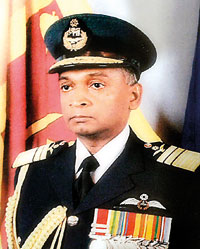 Air Chief Marshal Jayalath Weerakkody Air Chief Marshal Jayalath Weerakkody is a veteran of the Sri Lanka Air Force and has served the force for 30 years. He served as Commander from 1998 to 2002, a period that had seen heavy battles between troops and Tiger guerrillas. Upon retirement, he served a three-year stint as Sri Lanka’s Ambassador in Pakistan.
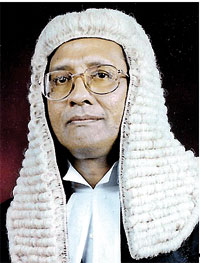 Harsha Anthony Joseph Soza Harsha Anthony Joseph Soza, President’s Counsel, is the son of late retired Supreme Court Judge J.F. Anton Soza. He has been in active civil law practice for nearly 49 years. He was appointed President’s counsel in 2004 and he worked in the chambers of K.N Choksy, President’s counsel (PC). He functioned for several years as Vice Chairman of the Ceiling on Housing Property Board of Review and the Rent Board of Review.
| |
Buying or selling electronics has never been easier with the help of Hitad.lk! We, at Hitad.lk, hear your needs and endeavour to provide you with the perfect listings of electronics; because we have listings for nearly anything! Search for your favourite electronic items for sale on Hitad.lk today!


Channel 4 conundrum compounded as Govt. takes contradictory stands
View(s):